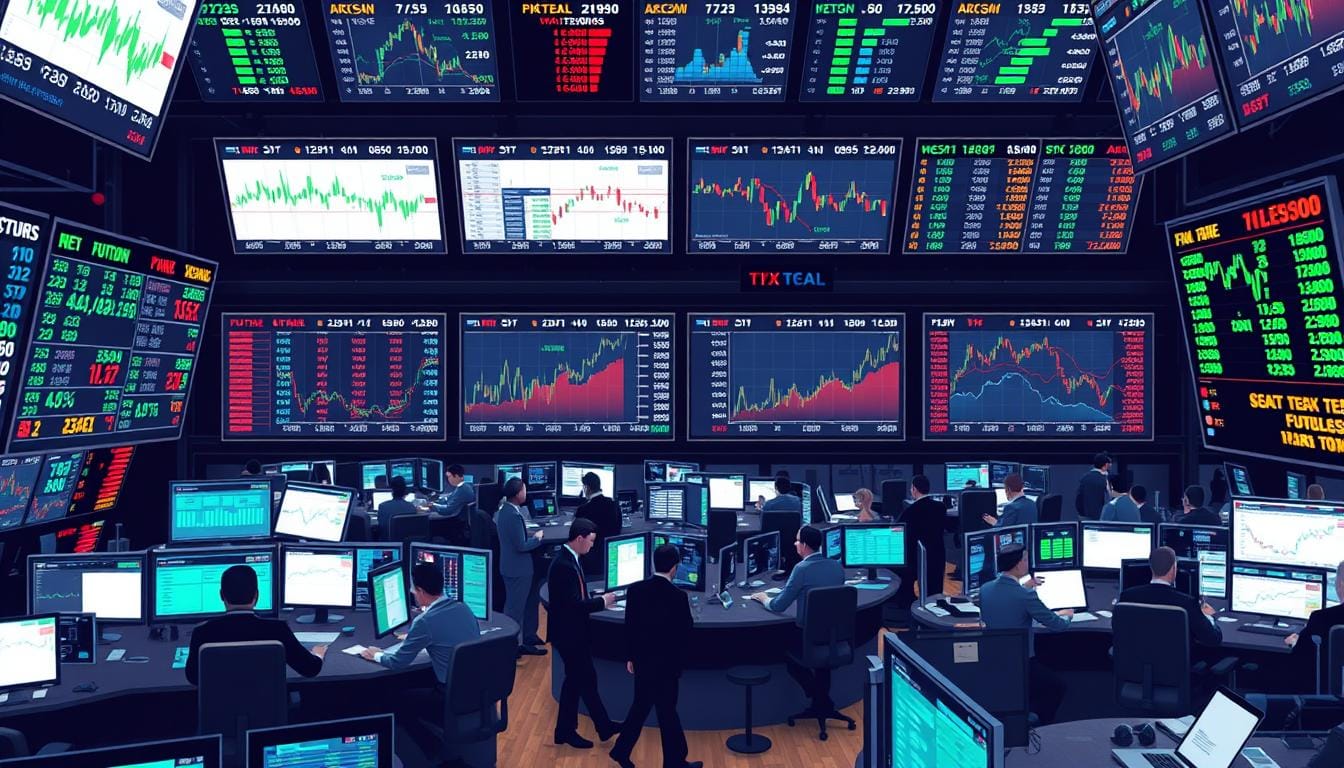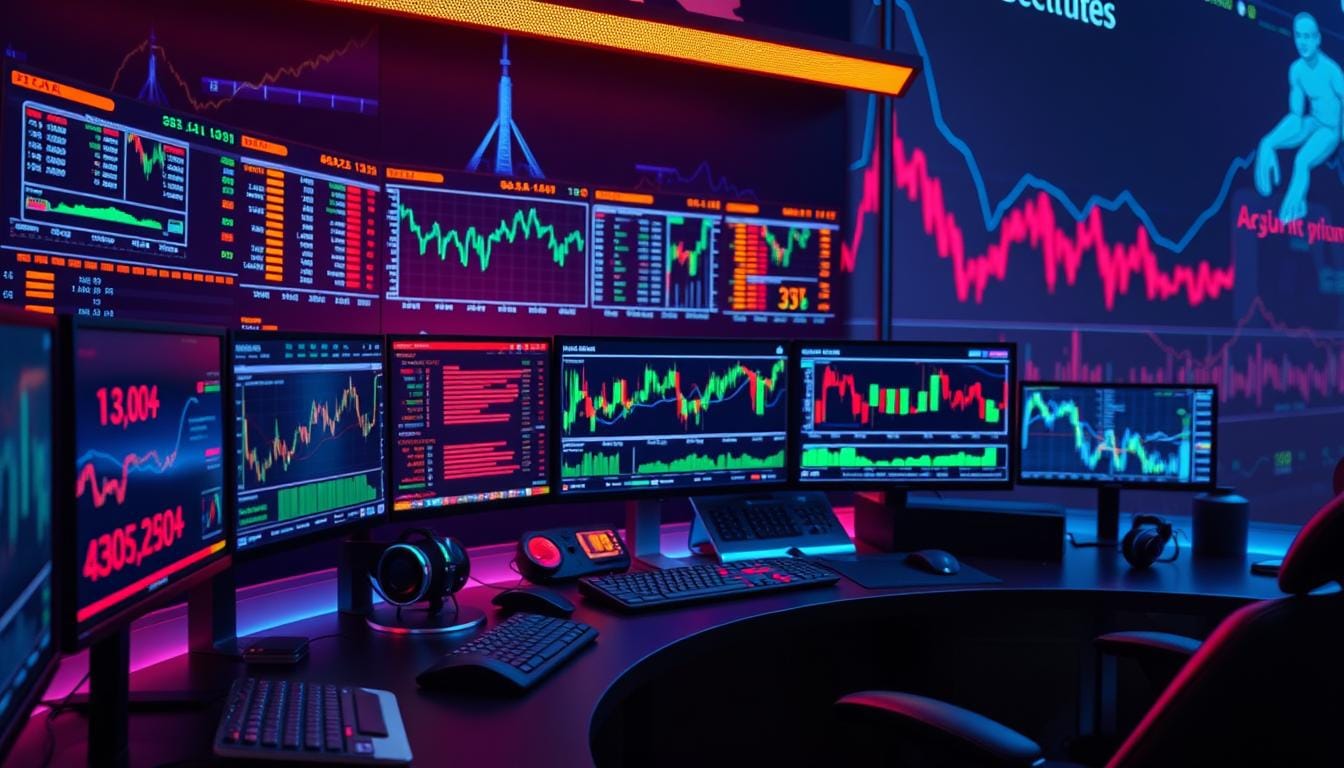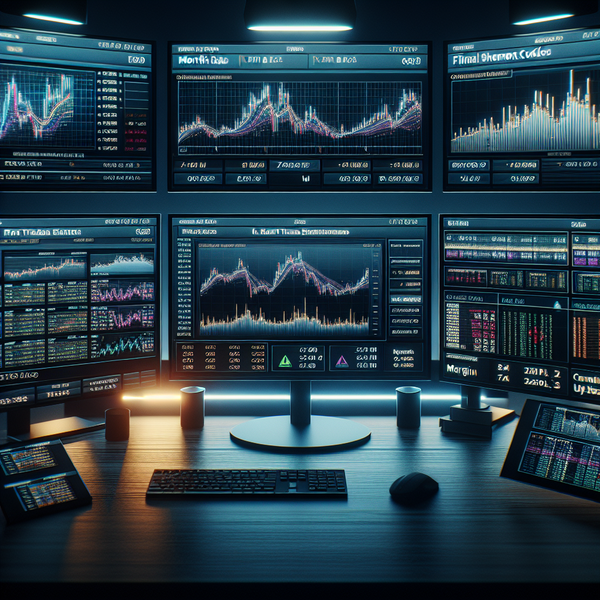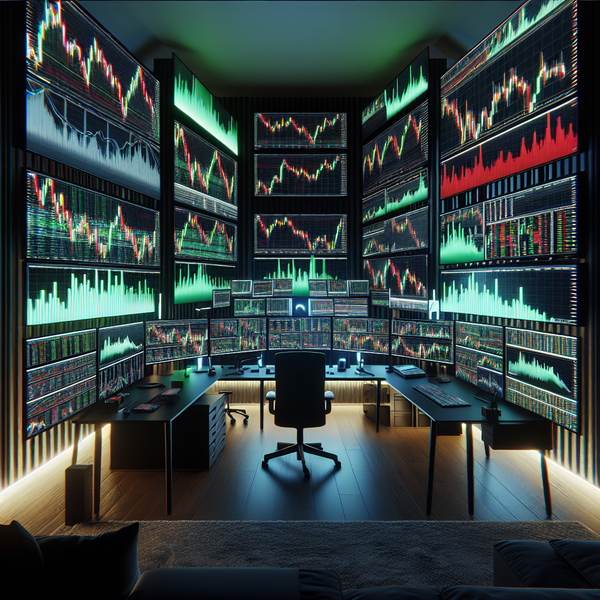A Complete Guide to the Futures Markets

A Complete Guide to the Futures Markets
Welcome to a deep dive into futures trading, titled A Complete Guide to the Futures Markets. You'll learn the basics, how it's used, and why it's key in finance today. This guide is perfect whether you're starting out or looking to get better at trading.
This guide covers everything about futures contracts, who trades them, and where the trading happens. Knowing how it all works lets you trade smarter and make good choices.
Every section of this guide sheds light on a new aspect of the futures markets. It's designed to deepen your understanding of trading commodities. Get ready to boost your trading skills!
Exploring the world of financial trading can be quite an adventure, especially in the futures market. For anyone looking to get started or improve their trading skills, diving into books on trading futures is a great first step. These books offer a treasure trove of knowledge, presenting complex concepts in an accessible way, and are designed to help both new and seasoned traders navigate the often choppy waters of the futures markets.

One essential title that comes up often is Technical Analysis of the Futures Markets. This book is particularly handy for those who want to get a deep dive into how to analyze market trends and price movements. Understanding these aspects is crucial because it helps traders predict future changes and make better trading decisions. The book covers a range of strategies and tools that are fundamental in crafting a solid trading approach, blending theoretical knowledge with practical insights.
In addition to specific titles, the genre of futures market trading books is vast and varied, ranging from introductory guides to detailed technical manuals. These resources focus on futures market analysis, a cornerstone for any successful trading strategy. They teach how to interpret data effectively and look beyond the numbers to gauge market sentiment and potential shifts. Whether you're just curious about how futures work or you're aiming to refine your trading techniques, these books are invaluable resources that offer guidance and expert advice to help you succeed in the dynamic world of futures trading.
A Complete Guide to the Futures Markets
For anyone wanting to succeed in trading, knowing the futures markets is key. These markets offer chances and challenges: understand them to win. Learning about futures trading gives you the tools for smart strategy making.
Why Understanding Futures Markets is Crucial for Trading Success
Futures contracts are complex and need deep market knowledge. When you understand the players and price changes, you’re ahead. Knowing analytical methods helps you assess markets well.
It’s important to know the truth about market myths. This ensures your strategies are solid. By understanding the market well, you can handle risks and grab chances. Good market knowledge means better trading success chances.
Understanding the Basics of Futures Contracts
Futures contracts are key for people getting into trading. These agreements set a future date to buy or sell an asset at a set price. Learning about how these contracts work is crucial for success in the futures market.
Futures contracts have set standards for quality and amount. For example, a December 2022 corn futures contract deals with 5,000 bushels of corn. A crude oil futures contract involves 1,000 barrels. This makes trading easier on big exchanges like the CME Group in the U.S.
The idea of futures contracts started in Japan in the 1700s. However, the modern form began in 1848 with the Chicago Board of Trade. Trading has since moved from shouting orders on a floor to electronic systems.
Trading futures means understanding margin and leverage. You pay a small part of the contract's total value upfront. This allows you to handle bigger positions with less money, increasing the chance for higher gains or losses.
The futures market has many players, from producers to speculators. Everyone contributes to the market's liquidity. Knowing how the market works is key for good trading strategies.
Key Terms in Futures Trading
Learning the key terms in futures trading is crucial. Terms like margin, leverage, open interest, and volume are very important. They help you make better decisions and manage risks.
Margin and Leverage
Margin is key in futures trading. It's the cash needed to open and maintain a market position. Leverage lets you control more of the market than your balance would allow. Knowing the difference between initial and maintenance margin is vital for risk management. This lets you decide wisely on how much money to use for trades.
Open Interest and Volume
Open interest shows the market's liquidity with unsettled contracts. It helps you understand market trends and where prices might go. Volume is about how many contracts are traded in a time. Open interest shows market depth, while volume shows activity level which can affect market volatility.
Settlement and Delivery
Settlement is crucial in futures trading. Contracts can end in cash settlement or by delivering the asset. Knowing this helps you plan your trades. Especially if you'll hold a contract to its end. It's important to understand these steps to manage your positions right.
Who Trades Futures and Why?
The futures markets have a variety of traders. Each type of trader has their own goals and approaches. It's important to know who is involved in futures trading. This helps us understand the changes in prices and trade volumes. The main players are hedgers, speculators, institutional investors, and brokers. They all help the market work smoothly by adding liquidity. This makes it easier to find out the real value of futures contracts.
The Role of Market Participants in Futures Markets
There are different kinds of traders in the futures markets. Hedgers are usually businesses that produce or need large amounts of commodities. They use futures to protect themselves from price changes in the things they buy or sell. Their trades help keep the market stable by providing needed liquidity. Meanwhile, speculators aim to make money from price changes. They are willing to take big risks, hoping to gain from market trends. Exploring the world of financial trading can be quite the adventure, especially in the futures market. For anyone looking to get started or improve their trading skills, diving into books on trading futures is a great first step. These books offer a treasure trove of knowledge, presenting complex concepts in an accessible way, and are designed to help both new and seasoned traders navigate the often choppy waters of the futures markets.
One essential title that comes up often is Technical Analysis of the Futures Markets. This book is particularly handy for those who want to get a deep dive into how to analyze market trends and price movements. Understanding these aspects is crucial because it helps traders predict future changes and make better trading decisions. The book covers a range of strategies and tools that are fundamental in crafting a solid trading approach, blending theoretical knowledge with practical insights.
In addition to specific titles, the genre of futures market trading books is vast and varied, ranging from introductory guides to detailed technical manuals. These resources focus heavily on futures market analysis and future market analysis, cornerstones for any successful trading strategy. They teach how to interpret data effectively and look beyond the numbers to gauge market sentiment and potential shifts. Whether you're just curious about
The Impact of Speculators and Hedgers on the Market
Speculators and hedgers play special roles in the futures markets. Speculators love market changes because they can make money from them. Hedgers try to avoid risks. A mutual fund manager, for example, might use futures to not lose money if they think the S&P 500 index will go down. This can really help reduce big losses. By understanding these roles, you get a better idea of how futures trading works. It shows how different strategies can either make or lose money, based on what the market does.

Futures Exchanges and Regulations
If you're getting into futures trading, it's key to understand how futures exchanges work. These platforms are where people buy and sell contracts for future transactions. They make global trading smooth. Futures are shaped by many factors, including prominent institutions and strict regulation, which guide market operations and trading practices.
Major Futures Exchanges Around the World
The world has several key futures exchanges. For example, the Chicago Mercantile Exchange (CME) offers a vast array of futures contracts for various assets. Next to it, the Intercontinental Exchange (ICE) stands out for its broad services and modern trading solutions. These exchanges are vital. They not only make markets more liquid but also guarantee traders access to important market data, aiding in smart decision-making.
Regulatory Frameworks in Futures Trading
Strict regulation is essential to keep the futures market honest and fair. The Commodity Futures Trading Commission (CFTC) plays a big role here. It monitors trading activities and ensures everyone follows the rules. This helps protect investors and supports fair trade, making the market more open. Knowing about these rules can help you trade more safely and keep your investments secure.
How to Start Trading in the Futures Markets
Starting your journey in futures trading needs careful planning and know-how. The first step is setting up your trading account. Picking the right futures broker is very important for a good trading experience. Choosing a trading platform that fits your goals helps you begin trading futures well.
Setting Up Your Trading Account
To create a trading account, you need to gather some key documents. This includes ID and financial info. Pick the type of account you want, like a standard one or one for futures trading. Knowing about fees like commissions and maintenance costs is crucial. This way, there are no surprises when you start trading.
Choosing the Right Broker for Futures Trading
Choosing the right broker is key to doing well in trading. Look for one with clear commission fees to save costs. A reliable, easy-to-use trading platform is important for good trade executions. Good customer support matters too; they help when you have issues. Find a broker that fits your trading style and goals by looking at their services.
Why Choose Funded Futures Network for Trading?
Funded Futures Network is great for new traders who want community support. They offer trading capital, so you can trade without risking your own money at first. They also have educational resources to help newbies understand futures markets. Being part of Funded Futures Network means you get to share knowledge and experiences, making trading easier to understand.

Developing a Futures Trading Strategy
Making a strong futures trading strategy is key for both new and experienced traders. Learning about different trading systems can make navigating the futures market's challenges easier. The aim is to pick methods that suit how you handle risk and your trading style.
Basic Futures Trading Systems
If you're starting out, simple futures trading systems focus on the basics can help a lot. Using easy strategies like trend following or moving averages helps you understand technical analysis better. These basic techniques can lead you to more complex methods later on.
Advanced Strategies for Experienced Traders
With more experience, you can look into more advanced strategies, such as algorithmic trading and quantitative models. These advanced systems need a deep knowledge of the market and technical analysis. To do well, you must backtest these strategies, which helps improve your returns and manage risk better.
Futures Market Analysis
Understanding futures markets means learning many analysis techniques. Knowing these methods well can make your trading much better. This is true whether you're a beginner or have lots of trading experience. Learning both fundamental and technical analysis will greatly help you make better trading choices.
Fundamental Analysis in the Futures Markets
When doing fundamental analysis, you look at economic factors, world events, and supply-demand dynamics. These influence commodity prices. By understanding these aspects, you can predict how the market will move. This lets you adjust your trading strategy to fit future changes.
Technical Analysis of the Futures Markets
Technical analysis gives another perspective on the futures markets. It uses chart patterns, indicators, and price changes to forecast market moves. With technical analysis tools, you can identify trends and make informed trades. Focusing on these skills improves market understanding and lowers trading risks.
Techniques for Minimizing Risks in Futures Trading
When you jump into futures trading, managing risks is key. Learning how to cut down on risks can really change your trading results. It's important to spread your investments in different areas. This way, you reduce the risk of big losses if one market goes down.
Using stop-loss orders is another way to guard your trades. These orders automatically close your trade if prices drop to a certain level. For example, in silver futures, setting a stop-loss at $18 limits your loss to $2 per ounce. This strategy protects your overall portfolio from big hits.
How much you invest in each trade is also critical. A good rule is to risk only 1%-2% of your total money on any trade. Staying within these limits helps you survive several losses. It’s crucial to follow a plan and avoid making trades based on emotion.
Improving your trading strategies by reviewing them is also effective. Looking back at your trades helps you spot patterns. This can lead to better decisions later on. The market always changes, so having a strong plan to manage risk is vital. With a focus on minimizing risks, you’re setting yourself up for lasting success in the unpredictable world of futures trading.
Innovations and Future Trends in Futures Markets
Recent advancements are changing futures markets, bringing in new innovations. Now, trading technology has gotten better. Artificial intelligence and machine learning are changing how trades are made. They help analyze data better, so traders can make smart choices fast. This makes trading more efficient.
Algorithmic trading has changed how we trade. It uses algorithms to make fast, precise trades. This makes trading smoother and lets traders make more trades quickly. It's great for when markets change fast.
More retail traders are getting into the market. Trading platforms are easier to use now, which encourages new traders. Cryptocurrencies are also making a big impact on futures markets. They're becoming a real type of investment. This opens new chances and challenges, moving futures markets in new directions.
Staying up to date with these changes is key for traders. Knowing about these trends can improve your trading. It leads to better decisions and outcomes.
Best Books on Trading Futures
Digging into futures trading gets better with the right books. "A Complete Guide to the Futures Market " by Jack D. Schwager is a top pick. It dives deep into technical and fundamental analysis. Over 720 pages, this book touches on the complexities of futures trading.
"Starting Out in Futures Trading" by Mark Powers is another must-read. It's packed with updated info across its editions. Powers shares insights from his time as chief economist at the Commodity Futures Trading Commission. For those interested in the mental side, " One Good Trade " by Mike Bellafiore talks about the importance of mindset in trading success.
Since 1986, " Technical Analysis of the Futures Markets " by John J. Murphy has been a key resource. It teaches critical trading techniques. Remember, learning never stops. Whether you're just starting or polishing your skills, these books are full of useful knowledge to improve your trading.
FAQs for A Complete Guide to the Futures Markets
How Can Beginners Learn More About Futures Markets?
For beginners eager to understand futures markets, starting with basic future market analysis can be crucial. Learning about the key terms, market functions, and the basic principles of trading can provide a solid foundation. Online resources, webinars, and introductory courses specifically tailored to futures trading are excellent ways to begin.
What Are the Best Futures Market Trading Books for Beginners?
For those new to the scene, several books lay out the fundamentals of futures trading in an accessible manner. "A Complete Guide to the Futures Markets" is essential for grasping concepts like technical analysis of the futures markets. Other recommended reads include "Trading Commodities and Financial Futures" by George Kleinman and "Futures 101" by Richard E. Waldron, which are both insightful and beginner-friendly.
How Can I Get Started on Trading Futures?
Getting started with futures trading involves a few key steps: educating yourself through futures trading systems and futures market analysis, opening a brokerage account, and starting to practice with a simulation or demo account. It’s crucial to understand the risks and mechanics of the market before committing real funds.
Can I Trade Futures Internationally?
Yes, trading futures internationally is possible and allows traders to access global commodities and financial instruments. Participants must be aware of the different regulations, time zones, and market behaviors that affect trading on international exchanges.
What Are the Biggest Risks in Futures Trading?
The biggest risks in futures trading include market volatility, leverage, and liquidity risks. Understanding these risks through comprehensive future market analysis and risk management strategies is essential. Traders should use stop-loss orders and only invest capital they can afford to lose to mitigate these risks.
FAQs About Funded Futures Network
What Services Does Funded Futures Network Offer?
Funded Futures Network offers a range of services designed to support futures traders, including educational resources, trading technology, and access to capital. Our services are built around helping traders leverage futures market analysis and futures trading systems to maximize their trading potential.
What Funded Futures Network Trading Plans Do You Offer?
Funded Futures Network provides various trading plans tailored to meet different levels of experience and investment. From beginner to advanced plans, each offers a unique combination of educational resources, trading capital, and risk management tools to help traders succeed in the futures markets.
How Much Funding Can I Qualify For?
The amount of funding traders can qualify for with Funded Futures Network depends on the account they select, account sizes are $25k $50k $100k $150k $250k.
What Technology and Tools Are Available With Funded Futures Network?
Funded Futures Network equips traders with advanced trading platforms, and real-time data essential for effective futures market analysis. You can use one of the 2 platforms provides in any account size, or you can use any platform that will connect to rithmic.



